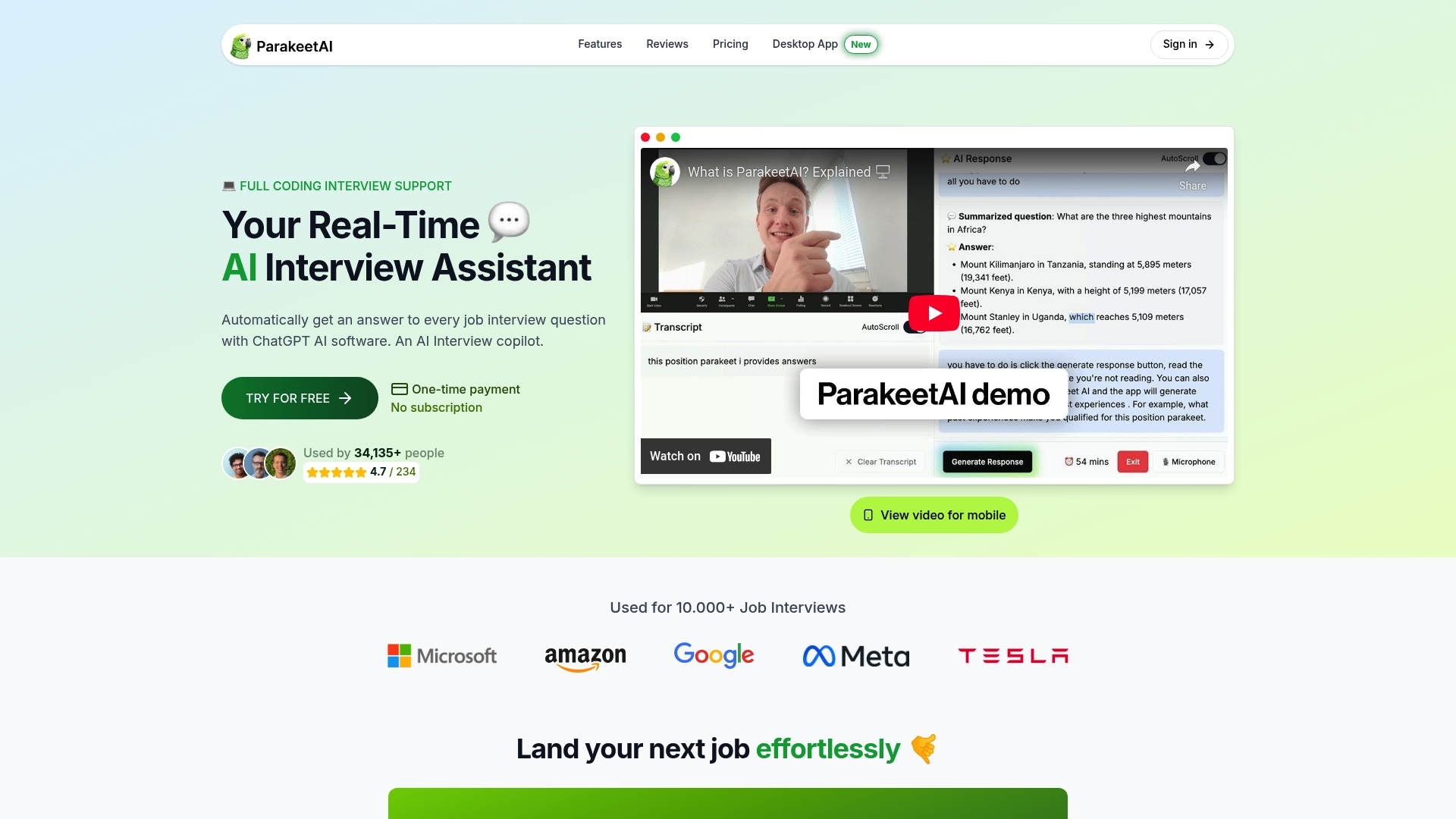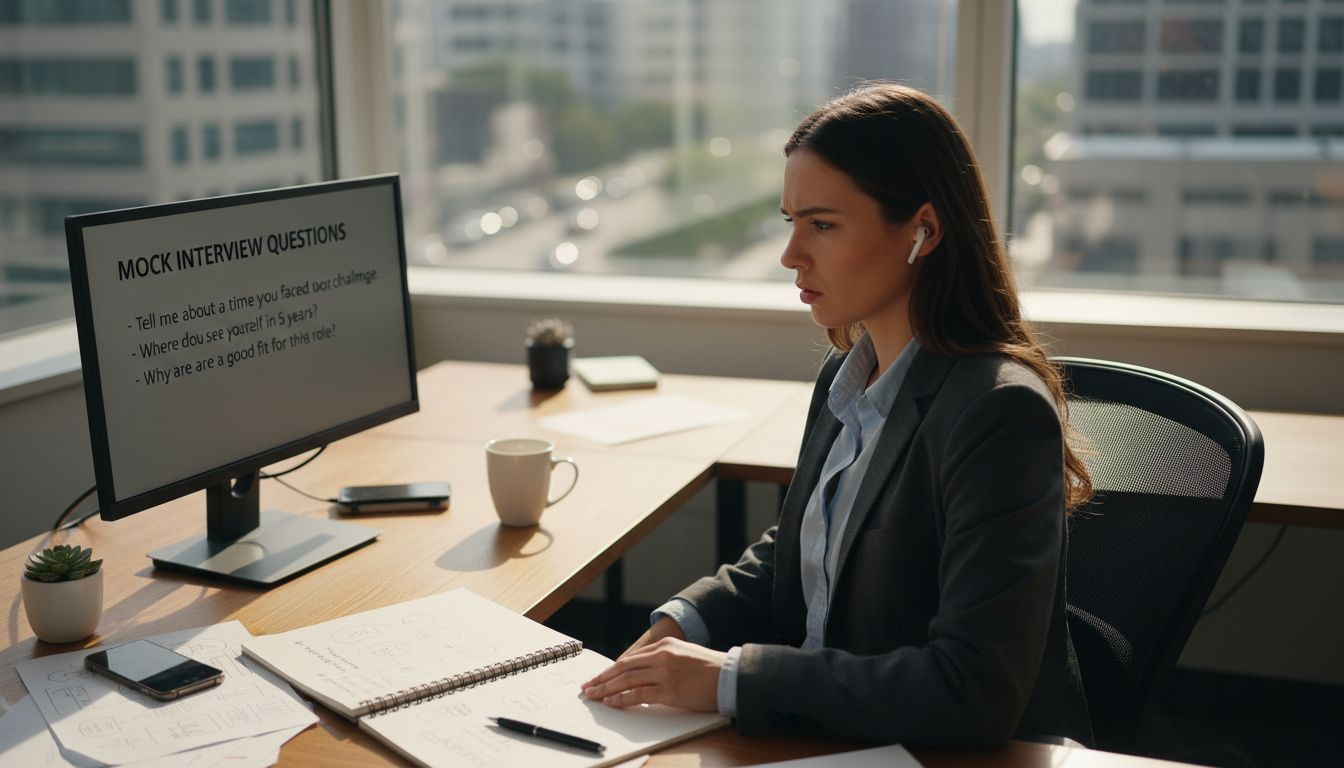Advantages of Interview Preparation: Complete Guide

Over 90 percent of hiring managers say preparation is the top factor they notice in standout candidates. Interview preparation matters because it goes far beyond rehearsing answers or choosing an outfit. It is the process that turns nerves into confidence and helps you communicate your strengths clearly. By building a strategy before interview day, you give yourself a real advantage that shows in every conversation and helps open doors to new opportunities.
Table of Contents
- What Interview Preparation Means
- How Preparation Builds Candidate Confidence
- How Preparation Sharpens Communication Skills
- Role of Mock Practice and AI Feedback
- Preparation’s Impact on Reducing Anxiety
- How Preparation Improves Interview Outcomes
Key Takeaways
| Point | Details |
|---|---|
| Comprehensive Preparation is Essential | Effective interview preparation involves researching employers, tailoring skills to job descriptions, and practicing potential interview questions to boost confidence and performance. |
| Confidence is a Skill | Strategic preparation, including mental preparation and skill rehearsal, builds interview confidence by transforming anxiety into articulate communication. |
| Communication Skills are Key | Developing communication skills through practice and feedback enables candidates to articulate their value proposition clearly and compellingly. |
| AI Mock Interviews Enhance Readiness | Utilizing AI-driven mock interviews provides realistic practice and personalized feedback, helping candidates identify improvement areas and boost interview performance. |
What Interview Preparation Means
Interview preparation is a strategic process that transforms job seekers from nervous candidates into confident professionals. According to University of Texas at El Paso, it involves comprehensive steps designed to maximize your chances of interview success.
Interview preparation encompasses several critical components that go beyond simply showing up on interview day. These include:
- Researching the employer to understand their mission and values
- Matching your skills precisely to the job description
- Practicing potential interview questions
- Preparing professional attire that represents your personal brand
Effective interview preparation is not about memorizing scripted answers, but developing a nuanced understanding of how to present your professional narrative. As insights from University of Edinburgh Careers suggest, understanding different interview formats and practicing strategic responses can dramatically improve your performance.
The goal of thorough interview preparation is to transform uncertainty into confidence. By investing time in researching the company, anticipating potential questions, and practicing your communication skills, you create a robust framework that allows your genuine professional capabilities to shine through. Your preparation demonstrates not just technical competence, but also your commitment, professionalism, and genuine interest in the role.
How Preparation Builds Candidate Confidence
Candidate confidence is not an inherent trait but a skill that can be systematically developed through strategic interview preparation. According to University of Texas at El Paso, practicing interview questions and preparing thoroughly can significantly boost a candidate’s confidence during the actual interview.
The process of building interview confidence involves several interconnected strategies:
- Mental Preparation: Developing a positive mindset and reducing anxiety
- Knowledge Acquisition: Understanding the company and role deeply
- Skill Rehearsal: Practicing articulation and response techniques
- Self-Assessment: Identifying personal strengths and potential improvement areas
Building confidence is not about creating a facade, but about genuinely understanding your professional value. By meticulously preparing, you transform potential nervousness into calm, articulate communication. How to Answer Interview Questions Confidently: Tips & Strategies can provide additional insights into developing this crucial skill.
Ultimately, interview preparation is a powerful psychological tool. When you invest time in understanding potential questions, researching the company, and practicing your responses, you create a robust internal framework. This preparation doesn’t just improve your external performance—it fundamentally shifts your internal narrative from uncertainty to self-assurance, allowing your authentic professional capabilities to shine through with genuine confidence.
How Preparation Sharpens Communication Skills
Communication skills are the cornerstone of successful interviews, transforming raw potential into compelling professional narratives. According to University of Edinburgh Careers, utilizing tools like Interview360 allows candidates to practice and refine their communication skills, leading to improved performance in actual interviews.
Effective interview communication preparation involves multiple strategic approaches:
- Articulation Practice: Developing clear, concise response techniques
- Active Listening Skills: Learning to understand and respond thoughtfully
- Nonverbal Communication: Mastering body language and professional presentation
- Storytelling Techniques: Crafting compelling professional narratives
The process of sharpening communication skills goes beyond mere rehearsal. Master the Best Interview Answers for Success can help candidates understand how to transform technical knowledge into engaging, memorable conversation.
Ultimately, communication skill development is a nuanced journey of self-discovery and professional growth. By systematically preparing, you learn to translate your experiences into powerful, authentic dialogue. This preparation helps you move beyond scripted responses, enabling you to communicate with confidence, clarity, and genuine professional insight. The goal is not to memorize answers, but to develop the agility to articulate your unique value proposition in any interview scenario.
Role of Mock Practice and AI Feedback
Mock interviews have transformed from traditional role-playing exercises into sophisticated preparation tools powered by artificial intelligence. A groundbreaking study from ArXiv explored how multimodal AI systems can realistically simulate technical interviews, providing candidates with nuanced, actionable feedback that builds confidence and improves communication skills.
The key components of effective AI-driven mock practice include:

- Realistic Scenario Generation: Creating interview-like environments
- Real-Time Performance Analysis: Instant feedback on communication skills
- Objective Performance Metrics: Quantifiable assessment of interview readiness
- Personalized Improvement Recommendations: Tailored guidance based on individual performance
According to University of Edinburgh Careers, tools like Interview360 enable candidates to record and review their responses, allowing them to critically examine elements such as eye contact, body language, and tone of voice. Master the Mock Interview Workflow for Job Success provides additional insights into maximizing these technological preparation tools.
Ultimately, AI-powered mock interviews represent more than just a preparation technique—they are a transformative learning experience. By providing a safe, controlled environment for practice, these tools help candidates deconstruct their communication patterns, identify blind spots, and develop a more strategic approach to professional interactions. The goal is not just to rehearse answers, but to cultivate genuine self-awareness and communication agility that extends far beyond the interview room.
Preparation’s Impact on Reducing Anxiety
Interview anxiety is a universal experience that can sabotage even the most qualified candidates’ performance. Understanding the psychological mechanisms behind this stress reveals how thorough preparation acts as a powerful anxiety-reduction strategy. The mental transformation from uncertainty to confidence begins long before you enter the interview room.
The key psychological mechanisms of anxiety reduction through preparation include:
- Predictability Reduction: Minimizing unknown factors
- Cognitive Rehearsal: Building mental muscle memory for responses
- Self-Efficacy Enhancement: Increasing belief in personal capabilities
- Stress Response Regulation: Learning to manage physiological anxiety symptoms
How to Overcome Interview Anxiety: Top Tips to Succeed offers additional insights into managing pre-interview nervousness. Preparation serves as a comprehensive defense mechanism against anxiety, transforming potential panic into structured, calm confidence.
Preparing for interviews is fundamentally an exercise in self-care and emotional intelligence. By systematically breaking down potential challenges, researching the company, practicing responses, and understanding your own strengths, you create a psychological buffer against performance anxiety. This approach doesn’t just improve interview outcomes—it fundamentally reshapes your relationship with professional challenges, turning potential sources of stress into opportunities for personal growth and self-discovery.

How Preparation Improves Interview Outcomes
Interview outcomes are not predetermined but strategically crafted through intentional, systematic preparation. According to University of Edinburgh Careers, effective interview preparation, including understanding different interview formats and practicing responses, leads to dramatically improved performance and successful results.
The key elements that transform preparation into successful interview outcomes include:
- Strategic Knowledge Mapping: Aligning personal skills with job requirements
- Response Optimization: Developing concise, impactful communication strategies
- Contextual Understanding: Researching company culture and interview expectations
- Performance Calibration: Identifying and addressing potential communication gaps
Preparing for interviews is more than a tactical exercise—it’s a comprehensive approach to professional storytelling. Understanding the Interview Preparation Process for Success provides deeper insights into crafting a compelling professional narrative that resonates with potential employers.
Ultimately, interview preparation is an investment in your professional self. By meticulously analyzing job descriptions, practicing responses, and developing a nuanced understanding of your unique value proposition, you transform interviews from unpredictable encounters into structured opportunities for showcasing your potential. This approach doesn’t just improve outcomes—it fundamentally repositions you as a proactive, strategic candidate who understands the deeper dynamics of professional communication.
Get Confident for Your Next Interview with Real-Time AI Support
Preparing for interviews can feel overwhelming especially when anxiety and uncertainty take over. This article highlights how thorough preparation sharpens your communication skills reduces anxiety and builds lasting confidence. Imagine having a personal AI assistant that listens to your practice sessions and offers instant, tailored answers to help you master each question with clarity and ease. Our tool addresses key challenges like building mental readiness and fine-tuning responses so you can face any interview scenario confidently.

Transform your interview preparation with Parakeet AI and experience how real-time feedback helps you polish your articulation and boost self-assurance. Visit Parakeet AI Interview Assistant now to start practicing smarter and seize every opportunity with confidence. Don’t let anxiety hold you back when a few moments of preparation with AI can change your entire outcome.
Frequently Asked Questions
What are the key components of effective interview preparation?
Effective interview preparation includes researching the employer, matching your skills to the job description, practicing potential interview questions, and preparing professional attire that reflects your personal brand.
How does interview preparation help in building candidate confidence?
Interview preparation builds candidate confidence by reducing anxiety, enhancing knowledge about the company and role, and providing practice in articulating responses, which helps reinforce a positive self-assessment.
What strategies can improve communication skills during interviews?
To improve communication skills during interviews, candidates should focus on articulation practice, active listening, nonverbal communication, and storytelling techniques to effectively convey their professional narratives.
How can mock interviews and AI feedback enhance interview preparation?
Mock interviews powered by AI provide realistic scenarios, real-time performance analysis, and personalized feedback, allowing candidates to practice and refine their communication skills and build confidence in their performance.




